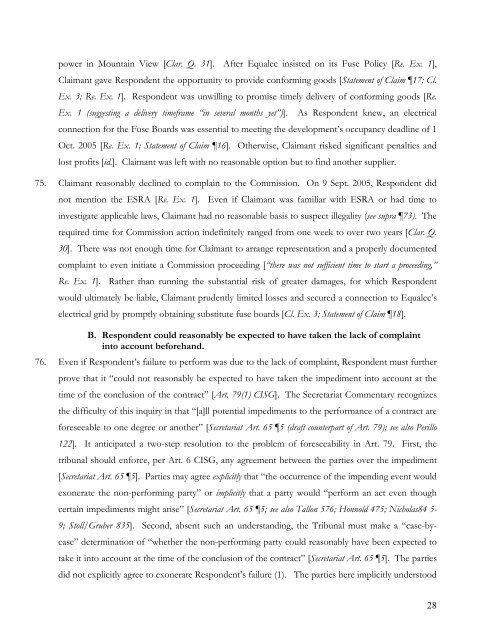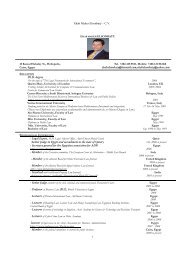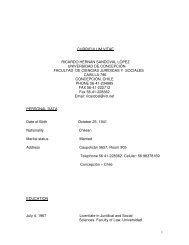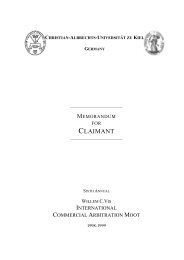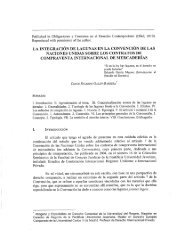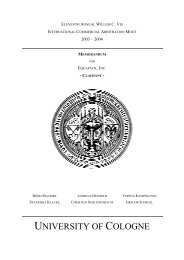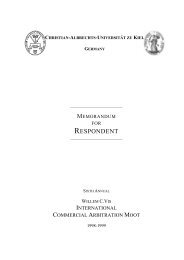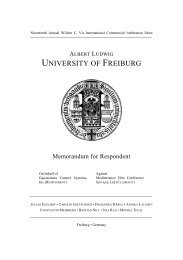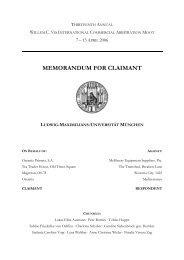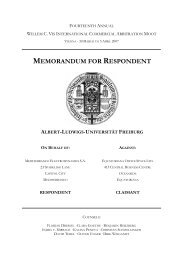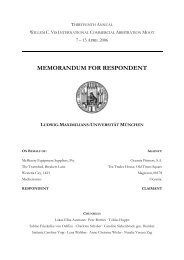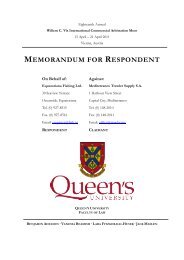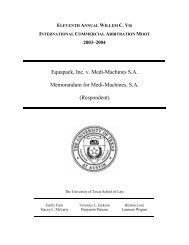CLAIMANT 0800 FINAL 12072006
CLAIMANT 0800 FINAL 12072006
CLAIMANT 0800 FINAL 12072006
Create successful ePaper yourself
Turn your PDF publications into a flip-book with our unique Google optimized e-Paper software.
power in Mountain View [Clar. Q. 31]. After Equalec insisted on its Fuse Policy [Re. Ex. 1],<br />
Claimant gave Respondent the opportunity to provide conforming goods [Statement of Claim 17; Cl.<br />
Ex. 3; Re. Ex. 1]. Respondent was unwilling to promise timely delivery of conforming goods [Re.<br />
Ex. 1 (suggesting a delivery timeframe “in several months yet”)]. As Respondent knew, an electrical<br />
connection for the Fuse Boards was essential to meeting the development’s occupancy deadline of 1<br />
Oct. 2005 [Re. Ex. 1; Statement of Claim 16]. Otherwise, Claimant risked significant penalties and<br />
lost profits [id.]. Claimant was left with no reasonable option but to find another supplier.<br />
75. Claimant reasonably declined to complain to the Commission. On 9 Sept. 2005, Respondent did<br />
not mention the ESRA [Re. Ex. 1]. Even if Claimant was familiar with ESRA or had time to<br />
investigate applicable laws, Claimant had no reasonable basis to suspect illegality (see supra 73). The<br />
required time for Commission action indefinitely ranged from one week to over two years [Clar. Q.<br />
30]. There was not enough time for Claimant to arrange representation and a properly documented<br />
complaint to even initiate a Commission proceeding [“there was not sufficient time to start a proceeding,”<br />
Re. Ex. 1]. Rather than running the substantial risk of greater damages, for which Respondent<br />
would ultimately be liable, Claimant prudently limited losses and secured a connection to Equalec’s<br />
electrical grid by promptly obtaining substitute fuse boards [Cl. Ex. 3; Statement of Claim 18].<br />
B. Respondent could reasonably be expected to have taken the lack of complaint<br />
into account beforehand.<br />
76. Even if Respondent’s failure to perform was due to the lack of complaint, Respondent must further<br />
prove that it “could not reasonably be expected to have taken the impediment into account at the<br />
time of the conclusion of the contract” [Art. 79(1) CISG]. The Secretariat Commentary recognizes<br />
the difficulty of this inquiry in that “[a]ll potential impediments to the performance of a contract are<br />
foreseeable to one degree or another” [Secretariat Art. 65 5 (draft counterpart of Art. 79); see also Perillo<br />
122]. It anticipated a two-step resolution to the problem of foreseeability in Art. 79. First, the<br />
tribunal should enforce, per Art. 6 CISG, any agreement between the parties over the impediment<br />
[Secretariat Art. 65 5]. Parties may agree explicitly that “the occurrence of the impending event would<br />
exonerate the non-performing party” or implicitly that a party would “perform an act even though<br />
certain impediments might arise” [Secretariat Art. 65 5; see also Tallon 576; Honnold 475; Nicholas84 5-<br />
9; Stoll/Gruber 835]. Second, absent such an understanding, the Tribunal must make a “case-by-<br />
case” determination of “whether the non-performing party could reasonably have been expected to<br />
take it into account at the time of the conclusion of the contract” [Secretariat Art. 65 5]. The parties<br />
did not explicitly agree to exonerate Respondent’s failure (1). The parties here implicitly understood<br />
28


